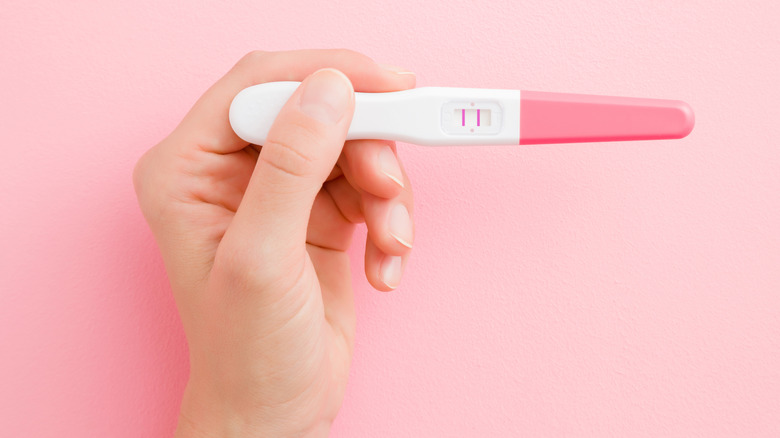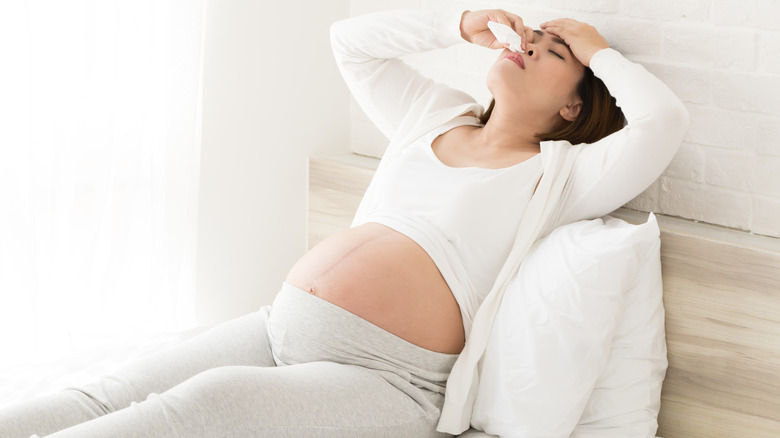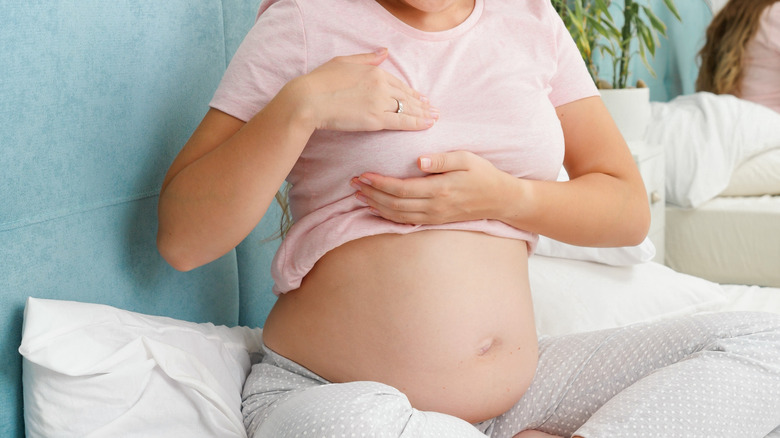Unusual Signs You May Be Pregnant
There are some pretty tell-tale signs to help you spot a pregnancy — nausea, a missed period, the unmissable visual cue of an expanding belly. Equally, many women experience a range of lesser-known symptoms, Dr. Mary Jane Minkin, a gynecologist and professor at Yale University School of Medicine, told Health Digest. And some folks get no signs whatsoever.
Your body may encounter a vast spectrum of physiological changes you didn't see coming during pregnancy, according to a study in the Cardiovascular Journal of Africa. After all, it's embarking on the herculean task of growing a brand new human, and it will continue to adapt in order to nurture and accommodate the fetus at different stages of development.
On average, women realize they're pregnant somewhere between the four- and six-week mark, when they've missed a period, explained a report in Maternal and Child Health Journal. But it's not always immediately obvious — many women aren't aware of their pregnancy until much later on. Researchers suggest that early detection and prenatal care in the first trimester might improve your chances of a healthy pregnancy and baby; however, women who discover their pregnancies late can also go on to have positive experiences. Here are some unusual indicators of pregnancy that might go overlooked.
Spotting or bleeding
"Some of the classic signs of pregnancy announce themselves fairly early on," gynecologist Mary Jane Minkin tells us – and spotting is one of them. Around 20 to 30% of pregnant women experience some sort of spotting or bleeding during their first trimester (via eMedicineHealth). This usually mimics a light period and occurs around the same time as an expected period, which may be why some women don't realize they're pregnant right away (via WebMD). A light blood flow during early pregnancy is sometimes caused by the implantation of the embryo into your uterus, explains Dr. Minkin. However, bleeding in the first trimester may also signal a serious problem; heavy or painful bleeding, in particular, could be a flag that something is off and shouldn't be glossed over.
The most pressing concern regarding bleeding is a potential miscarriage, in which case, it can last up to several days and tends to be heavier than a normal period (via MedlinePlus). Bleeding could also be due to an ectopic pregnancy. This occurs when the fertilized egg implants outside of the uterus, usually in the fallopian tube, and could be life-threatening if left untreated. Other serious complications include infection, hemorrhage, or molar pregnancy, in which abnormal placental tissue develops in the walls of the uterus. While these adverse outcomes are rare, it's better to err on the side of caution and consult your doctor or midwife if you observe any bleeding or pain and think you could be pregnant, advises MedlinePlus.
Your heart is beating for two
If it suddenly feels like your heart is galloping inside your chest and you suspect that you could be pregnant, you may be on to something. A racing heart is a fairly common symptom of pregnancy. In fact, a woman's heart rate increases by approximately 25%, according to a report in Heart. Some women experience heart palpitations or arrhythmia (an uneven heartbeat), which can feel different for each individual. For some, it may feel like their heart is beating too hard or too fast, fluttering and doing somersaults, or even skipping a beat. Others might get lightheaded, suddenly become breathless, or feel like the room is swirling around them.
An increased heart rate during pregnancy makes perfect sense since a woman's body has new demands to meet. Plasma volume increases by up to 40% to 50% at 32 weeks gestation to supply your baby with the blood it needs to survive and develop (via European Heart Journal). This extra blood means that your heart is busier than before and pumping faster than normal to circulate the blood through your body. These cardiovascular changes are usually harmless and fleeting, but more rarely they can be a harbinger of a more serious issue. So, if your heart becomes disconcertingly fast or you're suddenly missing heartbeats, it wouldn't hurt to pay your doctor a visit.
A heightened sense of smell
Anecdotal reports of a sudden bionic sense of smell during pregnancy have floated around for centuries (via Frontiers in Psychology). Certain odors may become intolerable or make you feel queasy, while previously unnoticed smells may suddenly have you salivating. An evolutionary explanation for this is that it helps pregnant women avoid ingesting foods that could be harmful to the embryo.
It's estimated that two-thirds of moms-to-be experience an elevated sense of smell, also referred to as "hyperosmia", which typically occurs in the first trimester (via What to Expect). Some scientists suggest that hyperosmia could be one of the factors responsible for morning sickness, given that our sense of smell and taste are knitted together. In fact, women who don't have a sense of smell (known as "anosmia") don't suffer from morning sickness, according to a study from the American Journal of Obstetrics and Gynecology.
Scientists have continued to connect the dots between this newfound olfactory sensitivity and fluctuating hormones (via Frontiers in Psychology). A woman's estrogen levels will soar during pregnancy, peaking just before she gives birth — this supports the uterus and placenta with forming blood vessels, transporting nutrients, and helping the fetus grow (via Healthline). Nevertheless, researchers speculate that there may be other hormones at play too, such as human chorionic gonadotropin (hCG), which rises rapidly and reaches peak levels around week nine. Studies have shown a correlation between the frequency of vomiting and nausea and hCG levels in the bloodstream.
Your senses are altered
Since your body is flooded with a new wave of hormones, you may detect a change in your other four senses as well. Newfound food cravings and aversions are fairly well-known among pregnant ladies, and studies have found that some women even experience changes in their hearing threshold. You may also notice a funny taste in your mouth — a phenomenon termed "dysgeusia" (via What to Expect). This often manifests as a metallic taste and it's noticeable around the first trimester, usually weaning off towards the end of pregnancy.
A study published in the journal Acta Oto-Laryngologica found that 92.8% of expectant mothers reported some kind of change in their gustatory sense, with a large number of women citing a change in sour taste. An explanation for dysgeusia offered by scientists in the past has been that zinc deficiency is common in the early stages of pregnancy. But the aforementioned study showed that women's zinc levels were generally in the normal range during their first trimester and only started to decline between the second and third trimesters when dysgeusia was less prevalent.
A change in hormones, namely a rise in estrogen, progesterone, prolactin, and human chorionic gonadotropin (hCG), are consistently pinpointed as the culprit behind dysgeusia during pregnancy (via What to Expect). A bit like your sense of smell, a change in taste buds may serve as a protective mechanism for the embryo by steering the mother away from toxic foods and drinks (via Frontiers in Psychology).
Your skin looks different
The skin is often a reliable sign of what's going on inside of us. Based on the findings of a 2017 study from the Journal of Epidemiology and Global Health, 99% of women experience physiological skin changes while pregnant, with nearly 88% citing some degree of hyperpigmentation. Most people have heard of the famous "pregnancy glow." This phenomenon is due to the increase in blood volume in the body, which gives a pregnant lady that slightly flushed, rosy-cheeked look, details the American Pregnancy Association. A combination of factors can also give rise to brighter, shinier skin, including a change in hormones, which probe the facial oil glands to generate more oil.
But radiant-looking skin aside, hormonal changes don't always create a flawless complexion. Many women complain of dermatological problems during pregnancy, including redness, dryness, rashes, and discoloration, reports a study from American Family Physician. Steadily rising estrogen levels can make your blood vessels widen, raising your risk of spider veins in the face and body. Women with preexisting conditions may also find that their skin looks worse for wear as their pregnancy progresses. For instance, if they've previously struggled with acne or psoriasis, these conditions might come back with a vengeance due to the extra oil on the skin during pregnancy (via Journal of Epidemiology and Global Health). The good news is that most of these skin issues settle down or resolve after giving birth, per the American Pregnancy Association.
Constipation
A possible pregnancy may not be your first guess for why you're constipated. But it turns out that constipation is a pretty common symptom, affecting nearly half of all pregnant women at some point, according to research from the journal Obstetrics & Gynecology. Of the 103 pregnant women observed, 24% reported constipation during the first trimester, 26% were constipated in their second, and 16% had constipation in their third, while 24% continued to experience constipation in the first three months after giving birth (via Reuters). The researchers found that women taking iron supplements were over three times as likely to be constipated than women who weren't taking supplements, while women with a history of bowel dysfunction also had a greater chance of facing tummy issues.
Constipation can occur fairly early on during pregnancy, Dr. Minkin from Yale School of Medicine tells Health Digest. This is because progesterone made by the developing placenta can relax the intestinal muscles and slow down bowel peristalsis. Other causes might include stress, anxiety, a lack of physical exercise, and a low-fiber diet, according to the American Pregnancy Association. Difficulty in passing stool and infrequent bowel movements are sometimes accompanied by abdominal pain or tenderness. Laxative pills generally aren't recommended throughout pregnancy due to their ability to induce uterine contractions and cause dehydration, so talk to your doctor about safer solutions like a gentle laxative or fiber supplement.
Nosebleeds
Nosebleeds are commonly overlooked as a sign of an early pregnancy, reports Medical News Today. Nosebleeds — medically termed epistaxis — are three times more common in pregnant women than in non-pregnant women, based on a study published in the journal Obstetrics & Gynecology. This can be largely attributed to those hormones at work again. Add to that the increase in your body's blood volume during pregnancy which causes your veins to dilate and become fragile, alongside the fact that your nose is packed with tiny blood vessels, and you have the perfect storm for recurring nosebleeds, according to a report in The Pan African Medical Journal.
Researchers speculate that there may be a link between a history of frequent nosebleeds in pregnancy and a heightened risk for postpartum hemorrhage (via Obstetrics & Gynecology). But the occasional nosebleed is rarely something to worry about and can usually be managed at home, per the UT Southwestern Medical Center. In the uncommon case that a nosebleed leads to a significant amount of blood loss, it could be life-threatening for both the mother and the fetus and may require immediate medical attention, warn doctors (via The Pan African Medical Journal).
Stuffy nose
A bit like nosebleeds, a stuffy nose may not be the first thing that springs to mind when you think of early pregnancy symptoms. But approximately 30% of pregnant women struggle with congestion, also known as "pregnancy rhinitis" (via BabyCenter). It may easily be confused with a cold, flu, or allergies. But this condition is a drag of its own making, caused by inflammation and swelling of the mucous membranes in the nasal passages, which most likely stems from hormonal changes, such as, oscillating estrogen levels. Once again, excess blood provoked by elevated progesterone may be to blame, since this can cause the blood vessels in the nose to expand, giving rise to stuffiness. The placenta also creates placental growth hormone, which has been linked to vasodilatation and nasal congestion, according to a report in The Pan African Medical Journal.
Pregnancy rhinitis typically lasts six weeks but it can hang around until the very end. As with many pregnancy-related ailments, though, it tends to ease up and disappear soon after delivery. If your stuffy nose is accompanied by other symptoms like itchiness, a fever, sore throat, or cough, you may be contending with a different condition. Be sure to get it checked out by your doctor if something feels off.
Weird dreams
Vivid dreams and nightmares are said to crop up frequently during pregnancy. And there's evidence that women may even remember their dreams in more detail when they're pregnant compared to before. Some experts attribute the sudden influx of peculiar dreams to all those hormones coursing through your body (via WebMD). Other researchers hypothesize that dreaming enables you to sort through your thoughts and emotions. Is it possible that your subconscious mind knows that you're pregnant before you do?
"There is a greater amount of actual dreaming and dream recall when a woman is pregnant than at any other time during her life," Patricia Garfield, author of "Creative Dreaming" and co-founder of the Association for the Study of Dreams, told WebMD. She added a very simple explanation, saying, "Pregnant women need to sleep more, and the more you sleep, the more you dream." Additionally, Garfield explained, "Twenty to twenty-five percent of your sleep is a dream state, and women who are pregnant are more likely to remember more of that percentage."
Forgetfulness
It appears that "pregnancy brain" is a real phenomenon. Up to 81% of pregnant women allude to a decline in cognition, which can impair their memory and concentration and cause feelings of disorientation, reports a study from the Medical Journal of Australia. A meta-analysis published in the Journal of Clinical and Experimental Neuropsychology revealed that pregnant women had much poorer performance on memory and free recall tests than non-pregnant women.
You can thank all those helpful hormones running riot in your body, hinted the researchers. Nevertheless, a study published in Brain and Cognition showed that although pregnant women scored lower on memory tasks than non-pregnant women, there was no association between their plasma hormone levels and test scores, suggesting that perhaps hormonal changes aren't at the root of these cognitive changes after all.
Some researchers point out that troubled sleep during pregnancy can contribute towards absent-mindedness, zapping women of their energy and brainpower (via Sleep). A 2021 study from the journal Brain Science discovered that pregnant women may experience changes to brain structure that can last up to six years after they've given birth. This may be the brain's way of shedding unnecessary neural networks so as to maximize its capacity during pregnancy, and it might have a secondary effect on memory. Needless to say, it's clear that more research is needed to pin down the specific mechanisms that underlie the memory deficits occurring during pregnancy.
Increased urination
The frequent need to urinate isn't just your body playing tricks on you — there are a number of reasons why pregnant women find themselves heading to the bathroom more often than usual, explain scientists (via Biomedica). According to one study, an uptick in needing to pee was reported by up to 72% pregnant patients. And as with most pregnancy-induced symptoms, hormones are cited as a primary culprit. Specifically, a rise in estrogen and progesterone leads to an increase in fluid levels, which means that the kidneys are working harder to eliminate waste through urination. Your uterus also expands and starts to put pressure on your bladder. Just like various other regions of the body, pregnancy brings about some pretty dramatic physiological changes in the urinary tract.
Increased urinary frequency can surface as early as seven weeks of pregnancy (via Biomedica). This usually subsides at some point in the second trimester but tends to make a comeback later on (via BabyCenter). Nocturia — the need to pee two or more times throughout the night — is experienced by approximately 86% of women by their third trimester. Some women face a host of other urinary-related problems like stress urinary incontinence, which is when the pelvic floor muscles weaken. This may occur as a woman's pregnancy progresses and the fetus gets bigger, pushing down on her bladder and urethra.
A rise in temperature
If you're heating up more than usual, you're in good company. A soaring temperature is another lesser-mentioned symptom that comes along with pregnancy, and it's usually at its highest in the early days of being pregnant (via Healthline). You may even find yourself experiencing hot flashes and waking up with night sweats. A woman's basal body temperature rises shortly after she ovulates and starts producing progesterone, subsequently dropping back down to normal — unless she's pregnant, in which case more progesterone is churned out to help maintain a healthy uterine lining and endometrium, causing your temperature to remain elevated (via You and Your Hormones).
Another thing that drives up your body temperature when you're pregnant is all that extra blood flowing through your veins, per Healthline. Not to mention the cardiovascular changes induced by pregnancy, which can cause a person to feel hotter than usual, since their heart has stepped up a gear and is working harder and faster to transport blood throughout the body.
"If you are having unprotected sex or using contraception sporadically and you experience these symptoms, it's very easy to do an at-home pregnancy test to know your result and eliminate any uncertainty," Dr. Mary Jane Minkin, a gynecologist and professor at Yale University School of Medicine, tells Health Digest. "The First Response Early Result pregnancy test can tell you that you are pregnant up to 6 days before the first day of the missed period."
Your breasts look or feel different
Have you noticed that your breasts suddenly look and feel different? If you're linking this to a possible pregnancy, you may not be totally off the mark. Changes to your breasts during pregnancy are more common than you may think and can be expected "almost from day one," says the American Pregnancy Association. Some women notice their breasts getting bigger. This sudden transformation is sometimes accompanied by soreness, tenderness, and heightened sensitivity (and not in a good way!).
Your breasts can start to feel itchy and achy due to stretching of the skin, particularly around the six-week mark. You might find that your nipples are more erect than usual while the bumps around them become more pronounced. And as the third month edges closer, it's common for women to start leaking a yellow discharge called colostrum.
Like many other pregnancy symptoms, breast changes are primarily driven by escalating hormones, such as estrogen, progesterone, and prolactin (the hormone that promotes milk production), which boost your blood flow and bring about physiologic changes in breast tissue. More rarely, some women may develop lumps (via Diagnostic and Interventional Imaging). These are usually harmless cysts or even benign tumors, but it doesn't hurt to get them checked out with your doctor, especially if you come across anything hard, painful, or otherwise concerning.
You feel exhausted
Many women feel sluggish and lacking in energy in the early days of pregnancy. According to a study from the journal PLOS One, 44% of pregnant women reported experiencing fatigue on a daily basis. This isn't surprising given that your body is working extra hard to develop and nurture a growing fetus. Yet, tiredness and sleepiness can easily be discounted or chalked up to something entirely different. But "fatigue may actually be one of the most common signs of pregnancy," Dr. Minkin tells Health Digest. "There's a popular statement about women eating for two — well, for some women, it's sleeping for two." Luckily, these lethargic feelings usually diminish or go away in the second trimester but tend to creep back in again during the third trimester.
A primary explanation for being hit with this sudden wave of exhaustion is the massive hormonal changes your body is undergoing, reports the American Pregnancy Association. A rise in progesterone can cause drowsiness and make you want to nod off just about anywhere and everywhere. There's also an increased demand for pumping extra blood around the body to carry nutrients and oxygen to your baby as well as fluctuating blood pressure and blood sugar levels. Plus, it probably feels like you're lugging around a little sack that just keeps getting heavier and heavier by the day. So, take it easy on yourself and give yourself permission to rest when you feel depleted.
Your mood is a rollercoaster
Have you noticed your emotions bouncing around all over the place recently? Mood instability is a prominent feature of pregnant and postpartum women, according to a 2021 study from the journal BMC Pregnancy and Childbirth. "Perinatal women often experience the highest euphoric, irritable, and depressed moods in early pregnancy and again around the time of giving birth," explains the study authors.
Add together the various drastic changes erupting around your body and you have a pretty solid recipe for a fluctuating mood. The sudden and dramatic increases in estrogen and progesterone during pregnancy can affect the chemicals in a woman's brain, making her even more susceptible to emotional ups and downs (via Journal of Affective Disorders). Approximately 10 to 25% of women experience depression or anxiety during their pregnancy, estimates a 2020 study from the Journal of Affective Disorders. And these conditions have been linked to an elevated risk of preterm birth and postpartum depression in some individuals. What's more, research indicates that people are more likely to report depressive symptoms during disease outbreaks, so, the COVID-19 pandemic is a particularly vulnerable time for pregnant women.
Although pregnancy depression can plague just about anyone, certain individuals may be more at risk than others. If you've been grappling with overwhelming emotions and think you could be pregnant, you don't have to suffer in silence. Reach out to your doctor or health care provider to discuss your symptoms and treatment options.
















